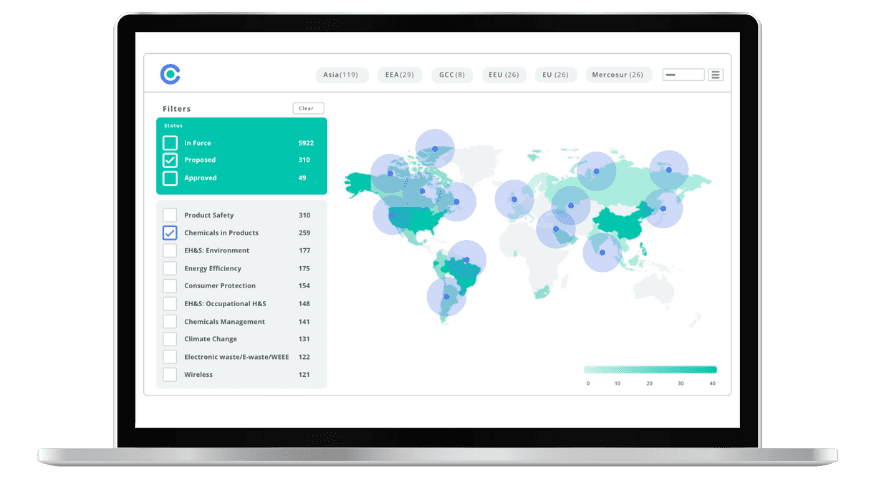
Sector Spotlight: Power Tools and Garden Machinery Regulatory Outlook

This blog was originally posted on 31st January, 2024. Further regulatory developments may have occurred after publication. To keep up-to-date with the latest compliance news, sign up to our newsletter.
AUTHORED BY JOYCE COSTELLO, SENIOR REGULATORY COMPLIANCE SPECIALIST, COMPLIANCE & RISKS
Introduction
While the power tool and garden machinery markets historically have received their share of regulatory attention in terms of ensuring their safety for use, the increased sophistication of products now being developed within these sectors, coupled with the urgent task of slowing the juggernaut of climate change, is prompting regulators to swiftly adapt their law-making efforts.
In this blog we examine the key Power Tools and Garden Machinery Regulations impacting the sector.
Cybersecurity
On the one hand, smart technology increasingly employed by companies to optimize product performance is being met with stringent regulation to address the cybersecurity threats inherent in such connected products.
In this regard, the UK has pipped the EU to the post. As of 29 April 2024, businesses in the supply chains of consumer connectable or smart products sold on the UK market must comply with the new security regime introduced under the Product Security and Telecommunications Infrastructure (Product Security) Act and its implementing regulations. Manufacturers will need to show their product meets minimum security requirements, to include passwords, reporting security issues and minimum security update periods and must also supply a statement of compliance. The broad definition accorded to a connectable product as an internet-connectable or network-connectable product, accompanied with limited and explicit exclusions, give these new measures a potentially very sweeping scope.
Environmental Concerns
On the other hand, global green policy and acute concerns about the adverse impacts of climate change is driving a shift in favor of quieter and cleaner electric technology. This in turn is bringing with it laws attacking the high noise profile of these products, in addition to emissions of pollutants from gas-powered machinery.
The United States has recently been swept by a wave of bans and restrictions on garden tools running on gas, for example in the prohibition on the use of gasoline-powered leaf blowers in the District of Columbia and Miami Beach. California will take a significant stride towards its zero-emission transition this year, and is targeting small, off-road engines (SOREs) in a statewide ban on the sale of new gas-powered lawn tools, to include leaf blowers and lawn mowers, comes into effect.
New Jersey also has a proposal in the works that would prohibit the sale or distribution of gas-powered leaf blowers within the State for use or operation. In Oregon, a similar ban would apply in counties with a population greater than 400,000. Elsewhere in Colorado, though approaching more tentatively than California, incentives are being considered which would steer that state to make the electric switch. Governor Polis has by Executive Order directed the Colorado Department of Public Health and Environment (CDPHE) and the Department of Personnel & Administration (DPA) to phase out gas-powered push and handheld lawn and garden equipment used at state facilities located in the ozone nonattainment area from 1 June 2025.
Batteries
Apart from the patent costs and upfront expense associated with electrification, companies already producing or shifting to battery-powered hand tools and garden machines also face new regulatory constraints. New rules created by the EU will soon require that batteries should be removable and replaceable by the end-user. And manufacturers powering their products in this way also face the possibility of minimum performance and durability requirements for such batteries.
Market Surveillance and Enforcement Actions
Companies within this sector, and a host of others, will all be justifiably concerned about a tightening up of market surveillance evident on both sides of the Atlantic, and a striking increase in enforcement actions taken against manufacturers.
Late last year the first ever corporate criminal enforcement action was brought under the CPSA against two corporate executives for conspiracy and failure to report information about a product defect. As the convicted individuals await sentencing (scheduled for March), their case should serve as a major warning to all manufacturers with obligations under that Act, notwithstanding the particularly extreme circumstances of the breaches in that case. It is a stark reminder that regulators will, where necessary, exercise their considerable enforcement clout, and with consequences that surely far exceed the cost of ensuring adequate compliance policies and processes are in place.
What’s Next for Power Tools and Garden Machinery Regulations?
The picture thus emerging is one of an intricately regulated product sector, bringing with it increased risks of business interruption, unforeseen costs and revenue misses in the event of a failure to comply with ever-demanding regulatory requirements.
Over the coming months, Compliance & Risks will delve deeper into the Power Tools and Garden Machinery Regulations affecting this highly regulated sector, and the most critical legal obligations that are a must-know for companies bringing products to market.
Stay Ahead Of Regulatory Changes
Accelerate your ability to achieve, maintain & expand market access for all products in global markets with C2P – Your key to unlocking market access, trusted by more than 300 of the world’s leading brands.
C2P is an enterprise SaaS platform providing everything you need in one place to achieve your business objectives by proving compliance in over 195 countries.
C2P is purpose-built to be tailored to your specific needs with comprehensive capabilities that enable enterprise-wide management of regulations, standards, requirements and evidence.
Add-on packages help accelerate market access through use-case-specific solutions, global regulatory content, a global team of subject matter experts and professional services.
- Accelerate time-to-market for products
- Reduce non-compliance risks that impact your ability to meet business goals and cause reputational damage
- Enable business continuity by digitizing your compliance process and building corporate memory
- Improve efficiency and enable your team to focus on business critical initiatives rather than manual tasks
- Save time with access to Compliance & Risks’ extensive Knowledge Partner network

RoHS Updates – What You Need To Know On The New Exemption Renewal Timeline
Learn about the exemption review process, and what manufacturers should do to ensure that they comply in our latest webinar


